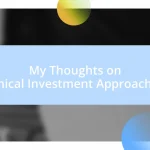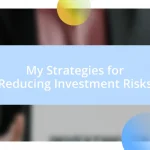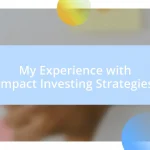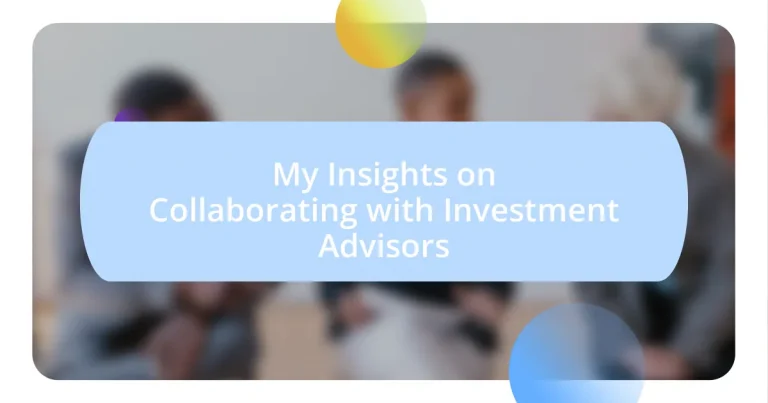Key takeaways:
- Investment advisors provide personalized strategies tailored to individual financial goals, enhancing confidence and clarity in investment decisions.
- Building a strong, trusting relationship with your advisor is essential, focusing on effective communication and alignment in values and objectives.
- Regular monitoring and adjustments of investment strategies are crucial for adapting to changing circumstances and maintaining alignment with evolving financial goals.
- Setting specific, measurable financial goals and revisiting them consistently fosters accountability and motivation throughout the investment journey.
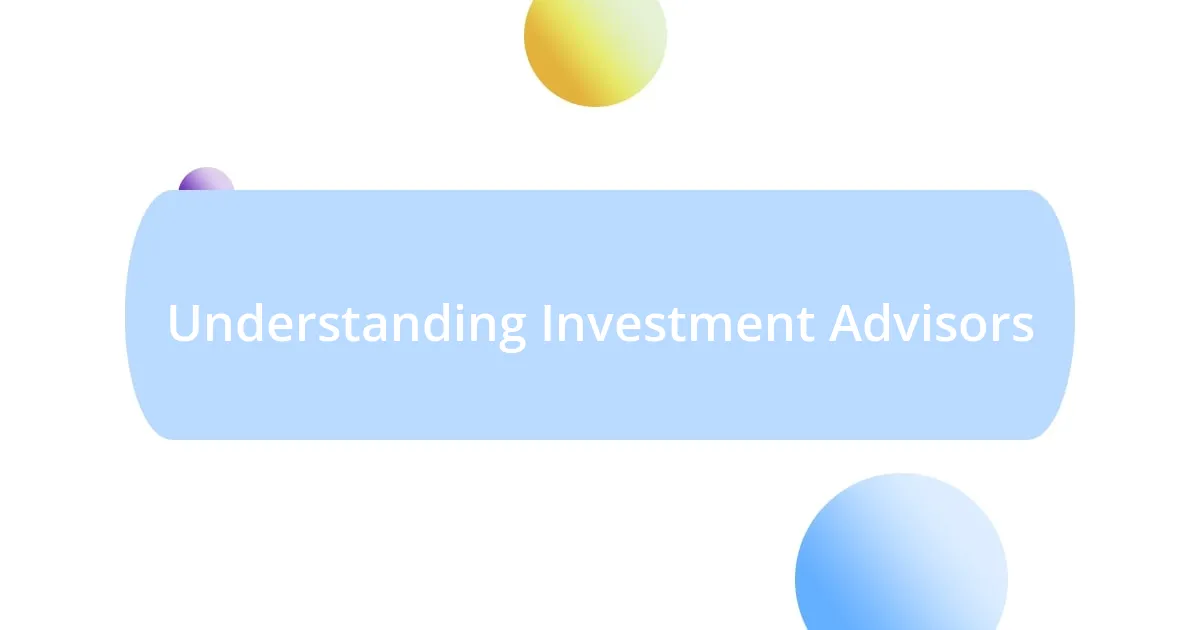
Understanding Investment Advisors
Investment advisors play a crucial role in helping individuals and organizations navigate the complex world of finance. I remember my early days in investing, feeling overwhelmed by the myriad options available. That sense of uncertainty is where a good advisor can provide clarity and direction.
What strikes me most about investment advisors is their ability to personalize strategies based on your financial goals. When I first met with mine, I was surprised at how much they truly listened. It felt less like a transaction and more like a partnership, which is vital in building trust and ensuring alignment with my aspirations.
Not all investment advisors are created equal, though. Some focus on short-term gains, while others emphasize long-term wealth building. Reflecting on my experiences, I often ask myself, “What type of advisor aligns with my values and objectives?” This question has guided me in choosing an advisor who supports my financial vision rather than pushing their agenda. And I genuinely believe that quality of relationship often trumps quantity of options.
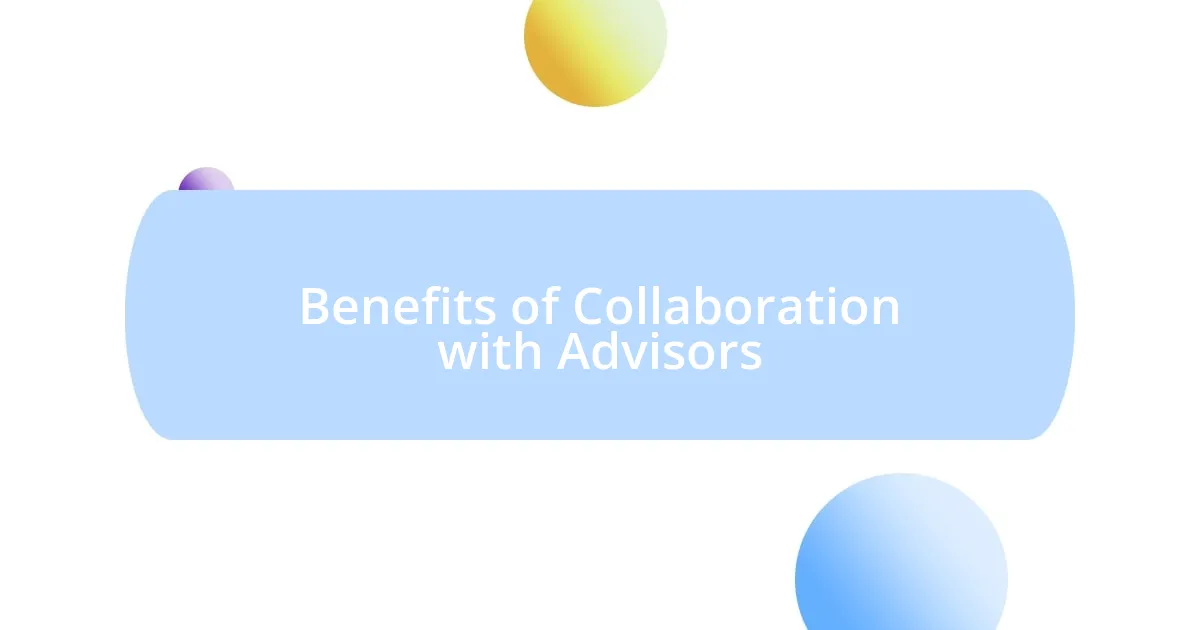
Benefits of Collaboration with Advisors
Collaboration with investment advisors brings a wealth of advantages that can significantly enhance your financial journey. I distinctly remember the first time I collaborated with an advisor; it felt like I had someone in my corner who genuinely understood my hopes and fears regarding investing. This partnership not only provided me with tailored insights but also bolstered my confidence in making informed decisions, ultimately leading to a more structured approach to achieving my financial goals.
A few key benefits of this collaboration include:
- Personalized Strategies: Advisors assess your individual circumstances and craft a strategy that aligns with your unique objectives.
- Expertise Access: You gain access to in-depth knowledge and market insights that you might not possess on your own.
- Emotional Support: Investing can be stressful, but having an advisor means having someone to calm worries and reaffirm your strategy during market volatility.
- Accountability: Regular check-ins with your advisor keep you on track and committed to your investment plan.
- Comprehensive Planning: Advisors consider all aspects of your finances, ensuring a holistic approach to wealth management.
Each of these elements stands out for me and reinforces how invaluable this collaboration can be, turning what can often feel like a solitary endeavor into one filled with support and guidance.
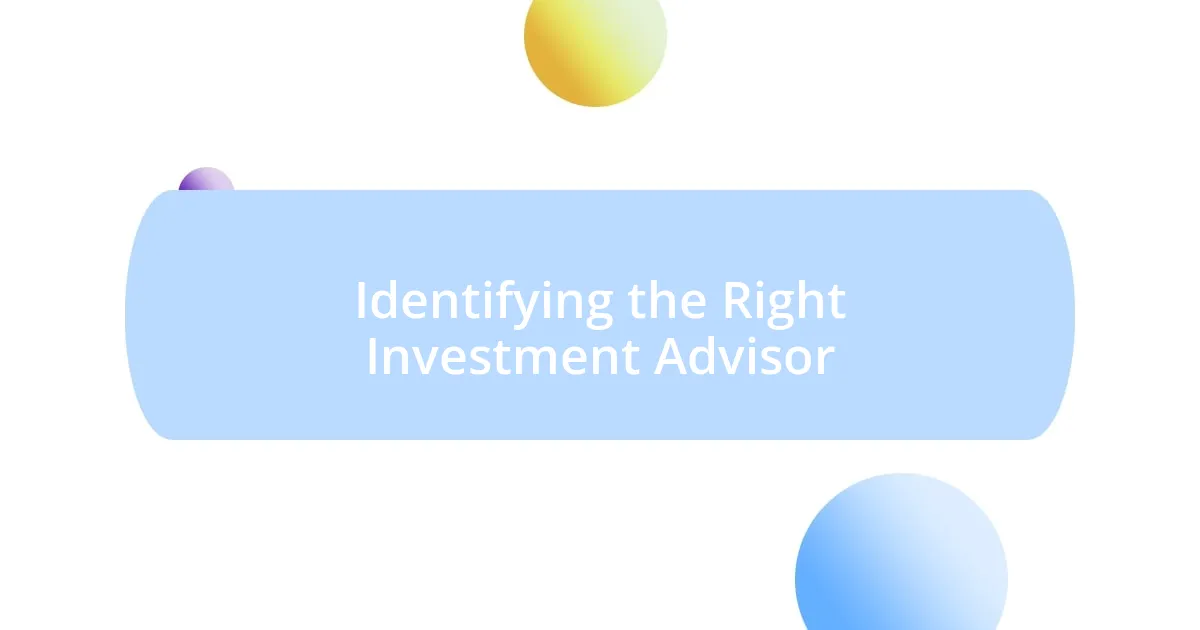
Identifying the Right Investment Advisor
Identifying the right investment advisor can feel like searching for a needle in a haystack. I remember when I first started reaching out to advisors, each consultation left me with a mix of excitement and apprehension. The key for me was to create a list of what I valued most—such as experience, communication style, and their understanding of my financial goals. It was eye-opening to realize how much these factors influenced my comfort and trust in their advice.
In my journey, I found that reputation matters significantly. I often searched for advisors through referrals, especially from friends or colleagues who had positive experiences. That personal touch can’t be overstated; knowing someone trusts their advisor provides a sense of security. When I met with my current advisor, their genuine approach and transparency about their methods immediately put me at ease, reinforcing how vital it is to feel a connection with them.
Lastly, I learned not to overlook the importance of compatibility. My advisor and I share similar communication preferences and values, which has made our collaboration much smoother. I recall a particular instance when we disagreed on an investment approach. Instead of feeling dismissive, my advisor took the time to explain their reasoning in a way that helped me understand. These discussions underscored to me the necessity of finding an advisor who respects my input while guiding me in the right direction.
| Criteria | Considerations |
|---|---|
| Experience | Look for advisors with a proven track record in investment strategies relevant to your goals. |
| Communication Style | Choose someone whose communication resonates with you, whether it’s formal or casual. |
| Reputation | Seek referrals and read reviews to gauge others’ experiences with the advisor. |
| Compatibility | Ensure you feel comfortable discussing your financial concerns and aspirations openly. |
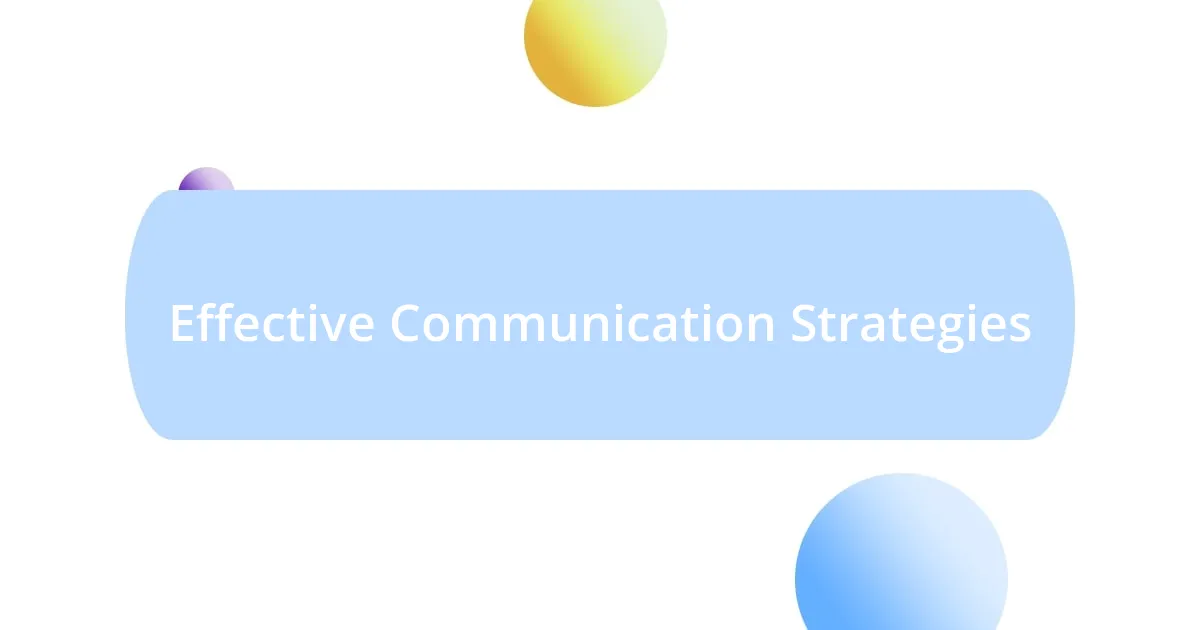
Effective Communication Strategies
Effective communication is fundamental when collaborating with investment advisors. I remember vividly the first time I articulated my financial goals; it felt like putting my deepest aspirations into words for the first time. I found that being open and honest about my fears and expectations allowed for a real dialogue. Have you ever had a conversation where you felt your thoughts were truly understood? Those moments are what build trust and establish a meaningful partnership with your advisor.
Clarity is another essential element. During my initial meetings, I often had to ask questions that seemed basic, but those inquiries were crucial for my understanding. An advisor’s ability to break down complex financial concepts into plain language made all the difference for me. I can’t stress enough how valuable it is when they take the time to ensure you know exactly what a strategy entails. It transformed what could have been overwhelming into something manageable and reassuring.
Regular check-ins are also vital for effective communication. In my experience, scheduling consistent meetings to review progress keeps both parties aligned. I always left those sessions feeling invigorated and equipped with new insights. It’s fascinating to see how ongoing communication strengthens the advisor-client relationship. How often do you review your financial strategies with your advisor? I found that these discussions not only provide clarity but also foster a deeper sense of accountability and shared purpose in achieving my investment goals.
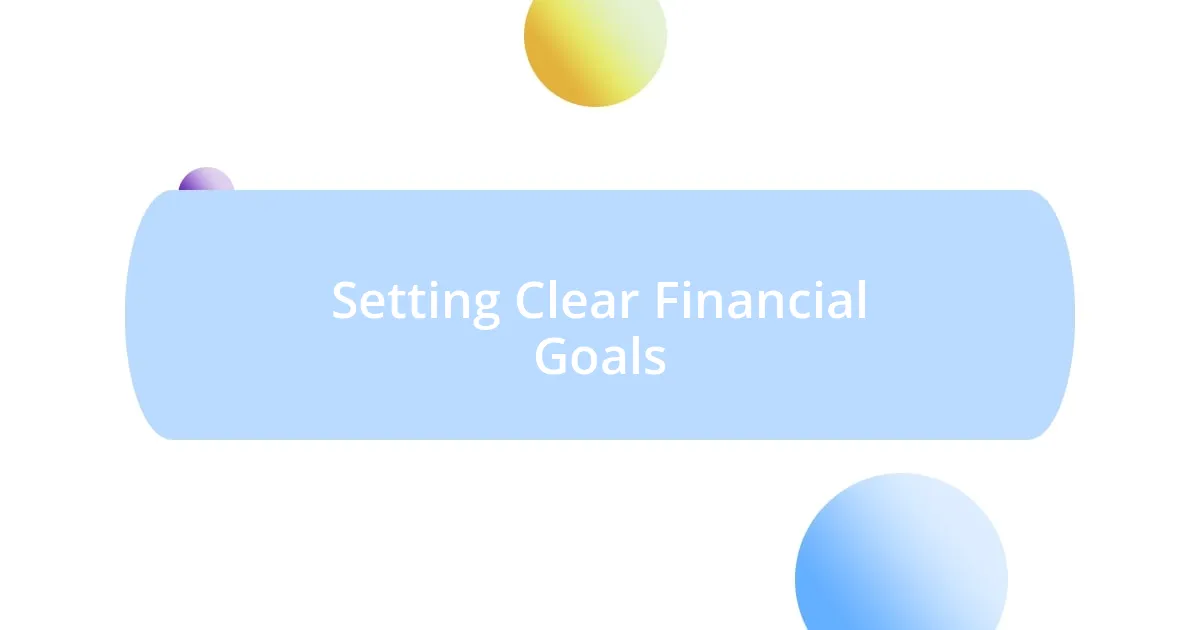
Setting Clear Financial Goals
Setting clear financial goals is the cornerstone of any successful investment strategy. I remember the day I sat down with my advisor and we created my roadmap. It was exhilarating to visualize my future: retirement, travel, and education for my kids. Have you ever taken the time to picture what your financial milestones look like? For me, that exercise transformed abstract ideas into concrete objectives.
I’ve learned that specificity is crucial when articulating these goals. Instead of saying “I want to save,” I broke it down into amounts and timelines, like “I want to save $50,000 for a family trip in five years.” It helped my advisor tailor strategies that aligned perfectly with my aspirations. Reflecting on this experience makes me realize how empowering it is to have measurable targets. How often do we set vague goals and then wonder why we feel stuck?
Furthermore, revisiting these goals regularly is something I can’t emphasize enough. During our annual reviews, I often feel a wave of excitement to see how close I am to achieving them. It’s a thrilling mix of accountability and motivation. Those discussions remind me to celebrate the small victories along the way. Setting clear, dynamic financial goals transforms the journey from a daunting task into a vibrant adventure filled with possibilities.
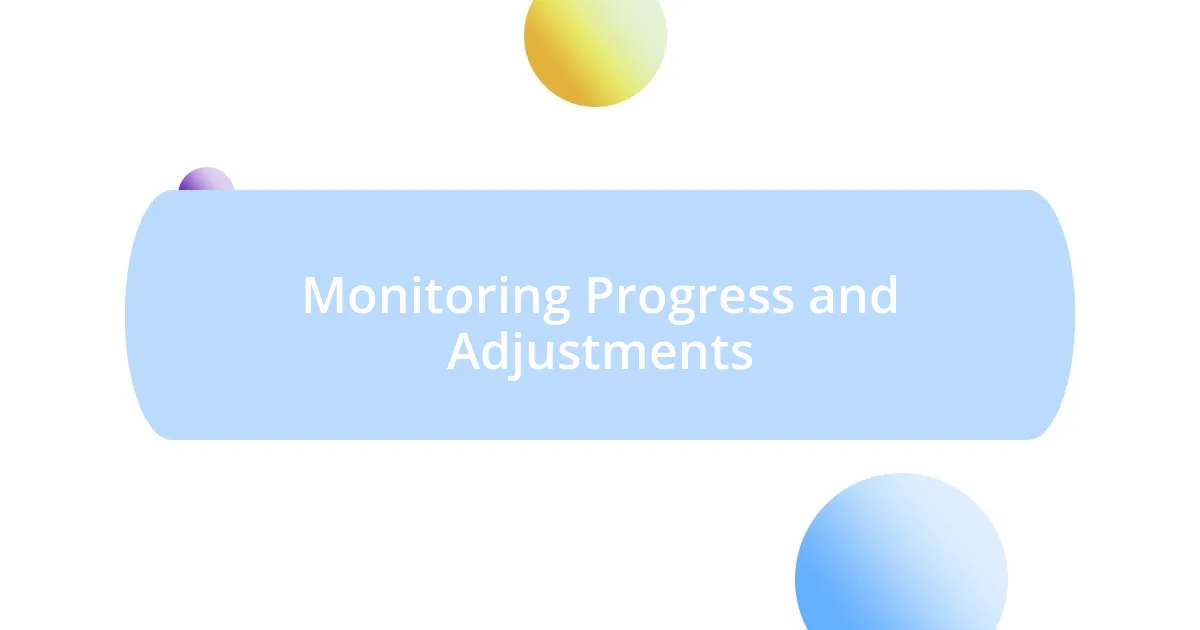
Monitoring Progress and Adjustments
Monitoring progress with your investment advisor is like having a financial pulse check. I still recall the moment when we reviewed my portfolio after a quarter; seeing tangible results was both exhilarating and nerve-wracking. Have you ever stared at a number and felt a mix of pride and anxiety? It’s a balancing act between acknowledging growth and recognizing the need for adjustments.
As I became more familiar with my investment landscape, I started to appreciate the importance of flexibility. There were times when my advisor and I had to pivot our strategies—certain assets weren’t performing as expected, or my circumstances had shifted. Isn’t it liberating to know that your financial plan isn’t set in stone? That agility is vital. It allows you to seize opportunities or mitigate risks as they arise, ensuring your portfolio aligns with your evolving goals.
After each review, I often took a moment to reflect on what I learned. Having those candid conversations about what worked and what didn’t transformed my understanding of investing. Each conclusion encouraged me to think critically about my financial decisions. How do you feel after assessing your investments? I found that these reflections deepen not only my knowledge but also my confidence in the advisor-client partnership, turning potential stress into strategic empowerment.

Building Long-Term Relationships
Building long-term relationships with your investment advisor is truly transformative. I remember one particular dinner I had with mine, where we swapped stories about our families and aspirations. It wasn’t just about numbers or charts; it was about connection. Don’t you think it’s important to have that personal touch in financial conversations? That evening, it became clear to me that trust forms the foundation of our collaboration.
As our relationship deepened, I noticed how open communication became second nature. I could share my fears about market downturns without hesitation. In fact, I distinctly recall expressing my anxiety when a big dip happened—my advisor listened and reassured me, turning that moment of panic into a constructive conversation. It’s this kind of dialogue that builds not just a partnership but a sense of security. Isn’t it comforting to know that someone genuinely understands your concerns and is there to guide you through the tough times?
What I’ve learned is that these relationships require ongoing effort. I make it a point to check in more frequently, share updates about my life, and find out how my advisor’s family is doing. These simple gestures create a more enriched connection, enhancing our teamwork in navigating financial strategies. Have you ever considered how investing in the relationship can yield dividends beyond your portfolio? It’s those small moments combined with consistent communication that ultimately strengthen trust and loyalty over time.




